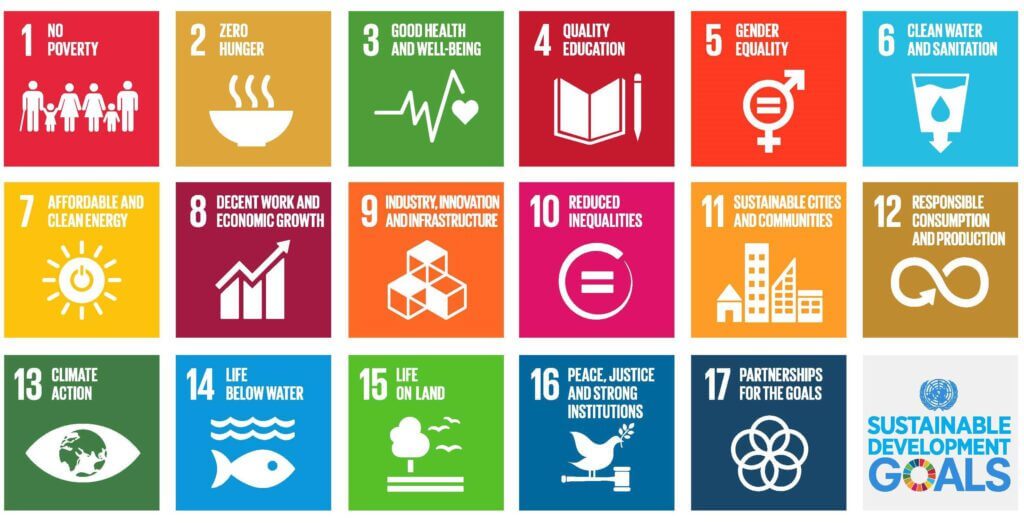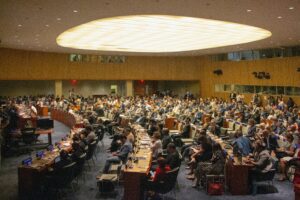The United Nations’ Sustainable Development Goals classify impact solutions and actions. They offer a clear framework to understand where companies have an impact. But, more importantly, they help define how they can improve their positive footprint to make the world better.
What are the UN Sustainable Development Goals?
In September 2015, as part of the 70th United Nations General Assembly, Heads of States and Governments adopted the Sustainable Development Goals (SDGs). The UN’s SDGs are the world’s joint plan to end extreme poverty, reduce inequality, and protect the planet by 2030. These objectives form a program of sustainable, universal and ambitious development; a program of the people, by the people, and for the people, conceived with the active participation of UNESCO.

Adopted by 193 countries, the SDGs emerged from the most inclusive and comprehensive negotiations in UN history and have inspired people from across sectors, geographies, and cultures. However, fulfilling these ambitions will take an unprecedented effort by all sectors of society. In addition, businesses, brands, and institutions have to play a vital role in the process.
The framework laid out a path over the next 15 years to end extreme poverty, fight inequality and injustice, and protect our planet. The SDGs apply to all nations and leave no one behind.
How do we assess actions towards the SDGs?
Along with the SDGs, the Commission adopted 232 targets or indicators to measure progress globally. In addition, governments and States are incentivised to define their own KPIs, depending on their national context.
For instance, France proposed 98 indicators. INSEE, the national institute for statistics, is in charge of tracking them.
Unfortunately, in 2019, the United Nations reported that no country was on track to reach the 17 SDGs by 2030.

What is the role of businesses in achieving these SDGs?
The success in achieving the SDGs requests the mobilisation of all: State, local authorities, associations, researchers, citizens, corporates and enterprises.
As major players in the economy, enterprises, small or big, are invited to align their strategy and governance with the SDGs. They have the power to positively impact and influence society and be a driver in reaching those goals. It will, for sure, require change and adaptability, with a review of their business plans.
Firstly, the SDGs define a framework for companies. Then, it aims for sustainable development, positive impact and influence on society, and shared values through the ecological and inclusive transition.
SDGs deal with societal issues in which companies have a significant role: the fight against inequalities, climate change and the erosion of biodiversity, energy production, technical innovation and economic growth.

Business engagement in achieving the SDGs can take many forms. Companies can, for instance, put in place specific policies to promote the circular economy, support local agriculture, defend gender equality or reduce energy or resource waste – all this by working in synergy with their partners and local actors. Companies also have a role in disseminating the SDGs within their ecosystem to engage all of their stakeholders.
Our interest in the SDGs
Today’s business landscape is characterised by an unprecedented, accelerating and complex mix of risks and opportunities. Be it a new technology or a sudden lack of natural resources; innumerable factors can disrupt entire markets in a very short period of time. In addition, new markets are emerging rapidly due to megatrends such as population growth, resource scarcity or global health risks. Meanwhile, consumers and investors are more knowledgeable and aware than ever before. Finally, they want businesses and brands to take responsibility for the pressure our planet and its population are under.
Business leaders and investors have a growing understanding that focusing on short-term profit are not enough. Instead, companies should pay growing attention to their impact on society, climate, communities, and their broader ecosystem. The businesses and brands that understand this challenge and act will be a step ahead.


